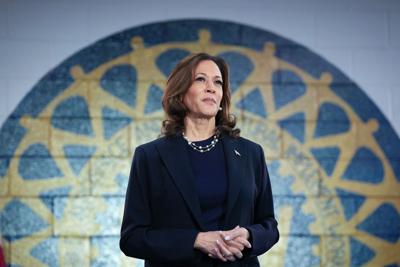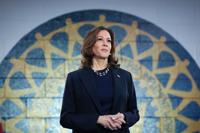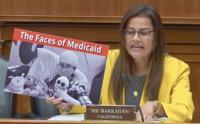With the presidential election around the corner, voters are paying closer attention to the candidates' campaigns and their plans on topics such as the economy, housing and health care.
During her campaign, Vice President Kamala Harris advocated for the elimination of medical debt, a cap on out-of-pocket drug costs for all Americans and boosting the expired child tax credit. Finding solutions to these issues can better the quality of life of all Americans.
Harris says health care is a pocketbook issue, meaning that it affects people’s financial resources. That’s why she keeps advocating for a health care plan that is affordable to all Americans, including minorities.
Harris is making a great effort to put health care at the forefront of her campaign, said Megan Messerly, reporter with Politico and panelist of the webinar “What Would Kamala Do on Health Care?” hosted by the USC Center for Health Journalism on September 18.
“The Biden Administration has done a lot of work on the economy, but people are not feeling it in their pocketbooks because they are looking at their budgets in grocery prices, not being able to afford a home [and that] child care is expensive,” said Messerly.
Harris hopes to work with states to achieve medical debt relief that will benefit everyone in the long run.
Harris wants to bring back that expanded tax credit of up to $2,000 for eligible families in her child tax credit plan. She also wants to create a newborn child tax credit that would provide $6,000 for parents of newborns to help them a little bit in that first year of life, explained Messerly.
Rachel Cohrs Zhang, chief Washington correspondent with STAT, said Harris has two models regarding medical debt. The first one is to have states use their unspent COVID-19 relief dollars to pay hospitals, mainly for older debts for low-income patients. The second option is to get federal Medicaid dollars and use them to pay hospitals billions of dollars to relieve medical debt and implement measures to keep patients from going into debt in the first place.
Environmental and health issues
While this is great news and a good start for a better economy and healthier communities, Southeast Los Angeles (SELA) residents insist environmental justice also goes hand in hand with health initiatives and must be included in the conversation.
Mario Beltran, a longtime resident of Bell Gardens and business owner, said his community has been addressing the issues of bad air quality, lack of green spaces and polluted water. The bad air quality has been going on for decades since SELA cities run along the 710 Freeway, and some of these industrial cities produce excess pollution.
“There is a clear correlation between the proximity to a freeway and your chances of developing asthma and other health issues,” said Beltran.
The lack of green spaces in highly dense cities is another issue the community faces. Beltran said the lack of these spaces affects people’s health, with issues related to obesity, diabetes and other conditions.
If Vice President Kamala Harris wins the presidency, Beltran hopes she can advocate for more solutions regarding health care and environmental issues in smaller communities.
Gil Hurtado, mayor and longtime resident of South Gate, said that while the Obama administration has learned about the small communities that comprise SELA in the past, it is very easy to forget about them and their everyday issues.
He said health insurance in SELA communities is vital because of all their health issues.
“For example, I have a good insurance [plan] my wife and I don’t have any issues going to the doctor, getting prescriptions, but that’s us. What about the people in our community that can't afford insurance?” he questioned. “I think we need to really start thinking and encouraging that we work on some universal health care”.
He said it is a shame that Canada and Mexico have better healthcare programs than the U.S.
The economy
Hurtado said it is impressive how things have changed negatively through the years. He remembers growing up in the 1960s. His father was a construction worker, and he was able to buy a house in East Los Angeles with one income. He had a car for work and another to go out with the family.
“We would go to Mexico, we would go to Disneyland. We could go everywhere, but my father could afford it with a salary of a construction worker. Why is it that my son, as a crime scene investigator, has a hard time coming up with enough money to pay for a mortgage,” questioned Hurtado.
With the housing shortage, Hurtado said it is unacceptable that housing construction is delayed in many SELA areas due to contaminated soil.
These struggles also affect health and the president should look for options to make people’s living more affordable, he feels.
Beltran commended Harris for supporting legislative initiatives that promote community health. He said she’s aware of some of the issues happening in SELA because she understands that environmental violations impact the most vulnerable communities.
“She is the environmental candidate in this election,” he said.
He also highlighted that the community must be educated in order to learn about the long-term impact many initiatives have on our health.
Hurtado said what is more important is that people–regardless of race or ethnicity– understand that the next president will greatly impact the country.
“I really hope that people see what’s going on and say, Kamala Harris is the one. She’s the solution,” he said.











(0) comments
Welcome to the discussion.
Log In
Keep it Clean. Please avoid obscene, vulgar, lewd, racist or sexually-oriented language.
PLEASE TURN OFF YOUR CAPS LOCK.
Don't Threaten. Threats of harming another person will not be tolerated.
Be Truthful. Don't knowingly lie about anyone or anything.
Be Nice. No racism, sexism or any sort of -ism that is degrading to another person.
Be Proactive. Use the 'Report' link on each comment to let us know of abusive posts.
Share with Us. We'd love to hear eyewitness accounts, the history behind an article.